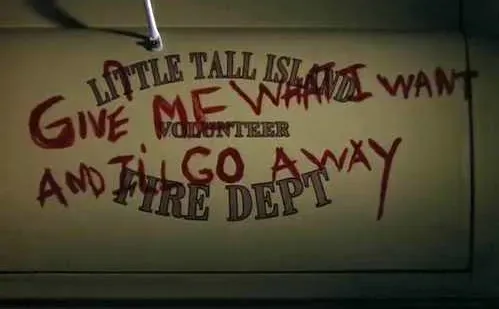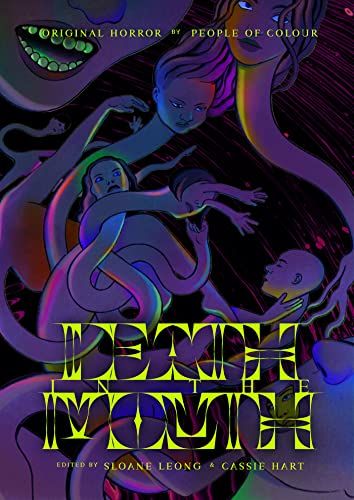Give Me What I Want and I'll Go Away – 101122
This is a newsletter by Christian Sager that comes out every other Tuesday. In it I attempt to make sense of the sensory chaos I experienced in the world. I try to sort that information along the model of Maslow's Hierarchy of Needs. This issue I write about bad air, generational conflicts, Stephen King's Storm of the Century, my decision not to run Kickstarter campaigns anymore, and what I'm reading for October.
Physiological
It's October and we've only had one or two proper days of fall weather. Climate change is bearing down on Portland with perpetual sunshine and heat. When it cools down a hair more I'd like to start taking the boat out again. But the air's been sour in the mornings here, smelling somewhere between a skunk's glands and burning petroleum. As I'm writing this the Nakia Creek Fire has lowered the air-quality enough that we've shut all the windows in the house.
Security
A topic that's coming up with increasing frequency in my casual conversations is the tension between Generation X and Baby Boomers over expectations of caregiving in the later's retirement. For many of us Gen Xers this feels like an uneven trade, given the latchkey kid upbringings most of us experienced. No particular thoughts at this time, but please send it my way if you know of any good writing on this topic.
Belonging
For October I’ve enrolled in a class at Movie Madness about Cult Horror Films of the 1980s. We had our first class last Tuesday and it was a lot of fun watching and learning about Slumber Party Massacre.

But there’s a different horror tale I want to talk to you about for early October, the television mini-series of Stephen King’s Storm of the Century. I first saw this show on ABC when it debuted in 1999 and I was living in a refinished New Hampshire funeral home with four other roommates. Since then I’ve watched it at least two more times, most recently last week. I’m a sucker for all the King TV adaptations, but this one in particular holds a special place in my dark heart.
King’s themes and point-of-view usually resonate with me, but I’m especially fond of Storm of the Century. Every time I watch it I can feel the town’s fateful decision trigger an almost primal response in me. Especially when the protagonist’s wife encourages him to commit murder and then over rules him on the potential sacrifice of their own child.
According to Nightmare on Film Street, the actress in that role actually wanted the director to cut the scene where she suggests he commit murder from the finished product because she thought King’s depiction of her character was too excessive. For me, her character’s choices are the knife in the gut that makes Storm of the Century so brutal to watch. She identifies herself as a caregiving protector of children, but when her chips are down she chooses her own well-being over her son’s. That depiction doesn't seem overly excessive to me; there are real people who make those choices everyday.
The hypocrisy of parents as upstanding, Christian citizens is a core King theme that takes the lead here. Storm of the Century has this and plenty of the other beats of his better known tales, like It, Salem’s Lot, The Stand, The Tommyknockers, or Needful Things. A small New England town has a supernatural problem that threatens its social order. There’s a lone protagonist who knows better than the generations of townsfolk around them. Those neighbors keep secrets and lie to themselves about what values they truly hold. Mike Flanagan effectively applied this same formula in last year’s Midnight Mass.
Storm of the Century is solidly Kingian in its characterization, setting, plot, dialogue, voice and tone. But it's that theme of hypocrisy that gets me more than anything.
That’s probably because I have personal experience with people similar to King’s characters, living in similar settings. I grew up in small New England towns, coming from a waspy, upper class family who thought of themselves as morally superior, despite a track record that proved otherwise. So when the antagonist André Linoge shows up in Storm of the Century, telling every hypocritical townie he meets to “Give me what I want and I will go away” — I kind of identify with him.

The adult side of me (when he’s in the driver’s seat) identifies with the protagonist, Ralphie’s father Mike. He’s a person trying desperately to do the right thing, even when he’s surrounded by “adulterers, pedophiles, thieves, gluttons, murderers, bullies, scoundrels, and covetous morons," as Linoge calls his neighbors. That makes it even more heartbreaking when (spoilers) Mike is the only one to resist Linoge, but still loses his son because his friends, family and community are so weak that they’ll do anything to save their hides, even sacrifice a child.
Simultaneously, the end hook of Storm of the Century is compelling to me, because the child part of me is actually envious of little Ralphie, who gets whisked away in the sky by a magical stranger who promises to teach him the secrets of the occult. If a charming demonic monster showed up in town when I was a child, I’d probably have said, “Yes please, take me with you.”
Esteem

I'll still occasionally support projects run on Kickstarter, but I won't run another campaign there. This has been a difficult choice, as it means postponing another issue of Corridor. But the company’s choice to move to a blockchain protocol is contrary to my personal values.
The environmental impact of blockchain alone is enough reason not to support them. I don’t care how many trees they claim they’ll plant to offset the emissions. That’s like saying murder should be legal, so long as you conceive a child for every person you kill.
In addition, Kickstarter is a platform that prides itself on its “community,” but didn’t involve community in their decision at all. They only formed an advisory council after they got called out in the first place. Both cryptocurrency and blockchain feel like pernicious fads — the most cancerous of pogs — popularized by people who want to get rich quick without taking responsibility for the risks they take.
On Friday, September 30 I read an interview on Dicebreaker with Kickstarter’s new CEO Everette Taylor. I hoped to see some conversation there addressing the company’s previously announced plans. Writer Chase Carter asked about blockchain multiple times, but Taylor’s response was always a form of “Here at Kickstarter, my priority is the core business.”
After reading the article I thought back to December of 2021, when Kickstarter first made this announcement. Many in the creator community responded with confusion and frustration, myself among them. I thought about all the people who stopped working with Kickstarter in the announcement’s wake, like Gloomhaven’s Cephalofair Games, the creators of Coyote & Crow, Iron Circus, and even Jamila Rowser, the company’s own comics consultant. So I tweeted the following:
I'm surprised I don't see more conversation about Kickstarter's new CEO, who has past experience selling NFTs and whose answer to questions about blockchain is to repeat "my focus is the core business."https://t.co/EOjKXUjDhR
— Christian Sager (@christiansager) September 30, 2022
No one engaged with it, showing me that creators are over the decision and have moved on to other outrages. When I woke up on Monday morning I'd received a response... from Taylor himself. Since I did not tag him, he must have run a search filter on Twitter for his name and/or the Dicebreaker story’s URL.
I've never sold an NFT in my life but I did work at an online art company who provided a way for our galleries (who requested it) to support their artists by selling NFTs on our platform through credit card payments but not on the blockchain. I really am focused on the core biz.
— Everette (@Everette) October 3, 2022
I responded, thanking him for the clarification, and wishing him well in his new career. Looking back on the article, I'd argue he's dabbling in semantics by saying "I've never sold an NFT in my life." But okay sure, he seems to believe there's a difference between actually selling them and facilitating the sale of them. I might argue that the facilitation is actually worse, but that would take us down a tangent when I'd prefer to focus on a different part of the story.
Later that day, news broke that Kim Kardashian was fined $1.26 million by the Securities and Exchange Commission for her role in promoting cryptocurrency. The next morning I read about how iHeartMedia — the company that swallowed my former podcast employer — was caught buying $10 million worth of fake downloads for their podcasts by laundering them through mobile video games.
Heather Cox Richardson wrote a paragraph that really stuck with me in relation to all these corporate dalliances in blockchain, crypto and paying something for nothing. The bold emphasis is mine.
After World War II, political philosopher Hannah Arendt explained that lies are central to the rise of authoritarianism. In place of reality, authoritarians lie to create a “fictitious world through consistent lying.” Ordinary people embraced such lies because they believed everyone lied anyhow, and if caught trusting a lie, they would “take refuge in cynicism,” saying they had known all along they were being lied to and admiring their leaders “for their superior tactical cleverness.” But leaders embraced the lies because they reinforced those leaders’ superiority, and gave them power, over those who did believe them.
We're so used to being lied to that when the truth is revealed we still celebrate the liar. Kim Kardashian won't blink at her fine. iHeartMedia won't suffer any consequences for selling snake oil to their advertisers. And Kickstarter won't admit they were wrong to tread down the blockchain path.
It occurred to me then that my distaste for Kickstarter’s blockchain announcement has two components. One is logical, based on the evidence that their decision was motivated by the reward of short term gains, despite their long term repercussions. If you’re looking for more details, I highly recommend reading Erin Ptah’s excellent overview on this topic: “Kickstarter won’t explain their blockchain protocol, so I will.” In there, Ptah did a better job than anyone I saw at articulating what the hell all of this actually meant.
The other component to my distaste is emotional, because I'm sick of the fictitious world created by consistent lies. It was the iHeart story that drove this home, as it was yet another example of how a digital media corporation has lied and cheated their way to the top. In this case, it just so happened to be run by the same people who served my walking papers back in 2017. As a result of that personal experience, I have an inherent distrust of the executives at places like this. As Jack Terricloth once said: Lawyers, CEOs, and Stockbrokers ain’t no heroes.
Self-Fulfillment
It's finally October Country, which means I'm hip deep in reading horror stories. In the past I've tried to read a story a day and share its synopsis on social media. I don't have the patience for that this year, so I'm mainly focusing on Peter Straub's novel Floating Dragon, which I picked up in Astoria. I got a new edition, but check out some of the covers this book's had over the years.




The other seasonal-flavored media I’m regularly consuming is a digital ARC of Home to Stay!: The Complete Ray Bradbury EC Stories. Look at this wonderful art by Jack Davis!

I have a growing collection of short story anthologies on my Kindle that I'll dive in and out of as well throughout the month. If you're looking for some recommendations, here are just a few of the books I'm looking forward to more of. Some covers below in another gallery.
- Weird Horror magazine
- Vasterian magazine
- The Children of Old Leech
- Year’s Best Weird Fiction
- Death in the Mouth
- Under Twin Suns
- Classic Monsters Unleashed: New Stories of Famous Creatures
- Black Cranes: Tales of Unquiet Women
- Your Body is Not Your Body
- Gemma Files – In That Endlessness, Our End
- Philip Fracassi – Beneath a Pale Sky
- Various Hellraiser comics





Resilient Gratitude
- French toast and chocolate milk for breakfast
- Sweating from yoga
- Troika

